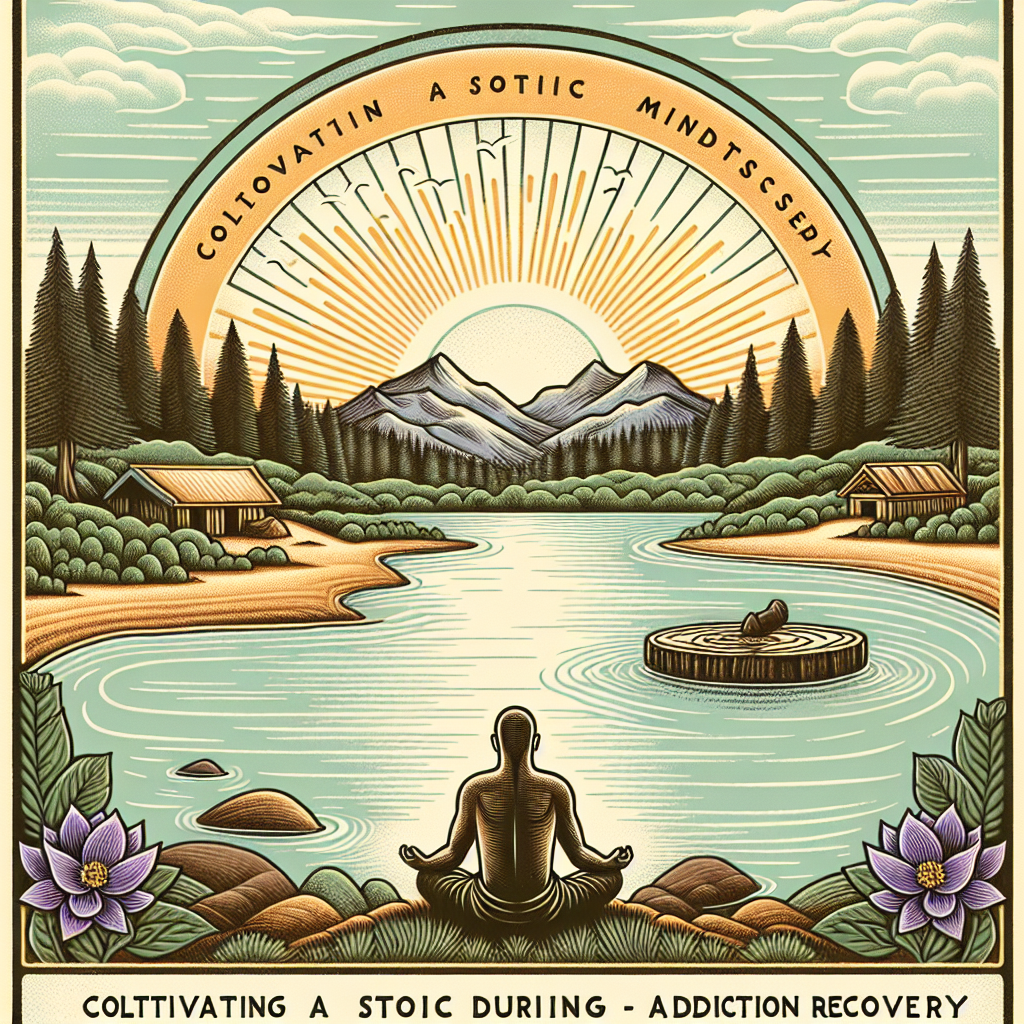-
Table of Contents

“Embrace Resilience: Cultivate a Stoic Mindset for Lasting Recovery”
Introduction
Cultivating a Stoic mindset in addiction recovery involves adopting principles from Stoic philosophy to foster resilience, emotional regulation, and inner peace. Stoicism, an ancient Greek philosophy founded by Zeno of Citium, emphasizes the importance of focusing on what we can control, accepting what we cannot, and maintaining a rational perspective on life’s challenges. In the context of addiction recovery, these principles can be particularly beneficial. By practicing mindfulness, embracing self-discipline, and developing a strong sense of personal responsibility, individuals can navigate the complexities of recovery with greater clarity and strength. This approach not only aids in overcoming addiction but also promotes long-term mental and emotional well-being.
Practical Steps to Develop a Stoic Mindset During Addiction Recovery
Cultivating a Stoic mindset during addiction recovery can be a transformative experience, offering a pathway to resilience, inner peace, and long-term sobriety. The Stoic philosophy, rooted in ancient Greek and Roman thought, emphasizes the importance of focusing on what we can control and accepting what we cannot. This approach can be particularly beneficial for those in recovery, as it provides practical tools to navigate the challenges and uncertainties that often accompany this journey.
To begin with, one of the foundational principles of Stoicism is the dichotomy of control. This concept encourages individuals to distinguish between what is within their control and what is not. In the context of addiction recovery, this means recognizing that while you cannot change the past or control the actions of others, you can control your own thoughts, actions, and responses. By focusing on what you can control, you empower yourself to make positive changes and reduce feelings of helplessness and frustration.
Another practical step in developing a Stoic mindset is to practice mindfulness and self-awareness. Stoicism teaches that our perceptions shape our reality, and by becoming more aware of our thoughts and emotions, we can better manage them. Mindfulness practices, such as meditation or journaling, can help you observe your thoughts without judgment and develop a greater sense of clarity and calm. This heightened self-awareness can be particularly useful in identifying triggers and patterns that may lead to relapse, allowing you to address them proactively.
In addition to mindfulness, embracing the Stoic practice of negative visualization can be a powerful tool in addiction recovery. Negative visualization involves imagining potential challenges or setbacks and mentally preparing for them. This practice can help you build resilience and reduce anxiety by normalizing the idea that difficulties are a natural part of life. For example, you might visualize how you would handle a situation where you are tempted to use substances again. By mentally rehearsing your response, you can feel more confident and prepared to face such challenges in real life.
Furthermore, Stoicism encourages the cultivation of virtues such as wisdom, courage, justice, and temperance. These virtues can serve as guiding principles in your recovery journey. Wisdom involves making informed and thoughtful decisions, while courage is about facing your fears and challenges head-on. Justice relates to treating yourself and others with fairness and respect, and temperance is about practicing self-control and moderation. By striving to embody these virtues, you can create a strong moral foundation that supports your recovery efforts.
Another key aspect of Stoicism is the acceptance of impermanence and the understanding that change is a constant part of life. This perspective can be particularly liberating for those in recovery, as it encourages you to let go of the past and embrace the present moment. By accepting that setbacks and relapses are part of the recovery process, you can approach them with a sense of compassion and determination rather than self-criticism and defeat.
Lastly, seeking support from a community that shares your values and goals can greatly enhance your ability to cultivate a Stoic mindset. Whether through support groups, therapy, or friendships, connecting with others who understand your journey can provide encouragement, accountability, and a sense of belonging. Sharing your experiences and learning from others can reinforce your commitment to recovery and help you stay grounded in your Stoic principles.
In conclusion, developing a Stoic mindset during addiction recovery involves focusing on what you can control, practicing mindfulness, embracing negative visualization, cultivating virtues, accepting impermanence, and seeking support. By integrating these practical steps into your daily life, you can build resilience, find inner peace, and navigate the challenges of recovery with greater confidence and clarity.
Harnessing Stoic Principles to Overcome Addiction Challenges
Cultivating a stoic mindset can be a powerful tool in overcoming the challenges of addiction recovery. Stoicism, an ancient Greek philosophy, emphasizes the development of self-control, resilience, and rational thinking. These principles can be particularly beneficial for individuals striving to break free from the grip of addiction. By harnessing stoic principles, one can navigate the tumultuous journey of recovery with greater clarity and strength.
To begin with, one of the core tenets of Stoicism is the distinction between what is within our control and what is not. This concept is crucial in addiction recovery, where feelings of helplessness and frustration often arise. By focusing on what we can control—our thoughts, actions, and responses—we can regain a sense of agency. For instance, while we cannot control the cravings that may arise, we can control how we respond to them. This shift in perspective can empower individuals to make healthier choices and stay committed to their recovery goals.
Moreover, Stoicism teaches the importance of accepting reality as it is, rather than as we wish it to be. This acceptance does not mean resignation but rather a clear-eyed acknowledgment of the present moment. In the context of addiction recovery, this principle can help individuals come to terms with their situation without self-judgment or denial. By accepting the reality of their addiction, individuals can take the necessary steps toward healing and growth. This acceptance also fosters a sense of inner peace, reducing the emotional turmoil that often accompanies recovery.
Another valuable stoic principle is the practice of mindfulness and self-reflection. Stoics advocate for regular self-examination to understand one’s thoughts, emotions, and behaviors. This practice can be incredibly beneficial in addiction recovery, where self-awareness is key to identifying triggers and patterns that lead to substance use. By regularly reflecting on their experiences, individuals can gain insights into their motivations and develop strategies to cope with challenges. This heightened self-awareness can also enhance one’s ability to stay present and focused on the recovery journey.
In addition to self-reflection, Stoicism emphasizes the cultivation of virtues such as courage, wisdom, and temperance. These virtues can serve as guiding principles in addiction recovery. Courage is essential for facing the difficulties and uncertainties that come with breaking free from addiction. Wisdom helps individuals make informed decisions and seek support when needed. Temperance, or self-discipline, is crucial for maintaining sobriety and resisting temptations. By embodying these virtues, individuals can build a strong foundation for lasting recovery.
Furthermore, Stoicism encourages the practice of gratitude and finding meaning in adversity. In addiction recovery, it can be easy to focus on the struggles and setbacks. However, by cultivating a sense of gratitude for the progress made and the lessons learned, individuals can maintain a positive outlook. Finding meaning in the recovery process can also provide a sense of purpose and motivation. Whether it is through helping others, pursuing personal growth, or reconnecting with loved ones, finding meaning can transform the recovery journey into a path of self-discovery and fulfillment.
In conclusion, harnessing stoic principles can offer invaluable support in overcoming the challenges of addiction recovery. By focusing on what is within our control, accepting reality, practicing mindfulness, cultivating virtues, and finding meaning in adversity, individuals can develop a resilient and empowered mindset. This stoic approach not only aids in navigating the recovery process but also fosters personal growth and inner peace. As individuals embrace these principles, they can transform their lives and emerge stronger, wiser, and more resilient in their journey toward lasting sobriety.
Q&A
1. **Question:** How can practicing mindfulness help in cultivating a Stoic mindset during addiction recovery?
**Answer:** Practicing mindfulness helps in cultivating a Stoic mindset during addiction recovery by encouraging individuals to focus on the present moment, recognize and accept their emotions without judgment, and develop greater self-awareness and self-control, which are key principles in Stoicism.
2. **Question:** What role does the Stoic principle of “amor fati” play in addiction recovery?
**Answer:** The Stoic principle of “amor fati,” which means “love of fate,” plays a role in addiction recovery by encouraging individuals to accept and embrace their past experiences, including their struggles with addiction, as necessary parts of their journey. This acceptance can reduce feelings of regret and self-blame, fostering a more positive and resilient mindset.
Conclusion
Cultivating a Stoic mindset in addiction recovery involves embracing key Stoic principles such as focusing on what is within one’s control, practicing mindfulness and self-awareness, and developing resilience through acceptance of life’s challenges. By internalizing these principles, individuals can better manage their emotions, reduce stress, and maintain a balanced perspective, ultimately supporting their journey towards sustained recovery and personal growth.



